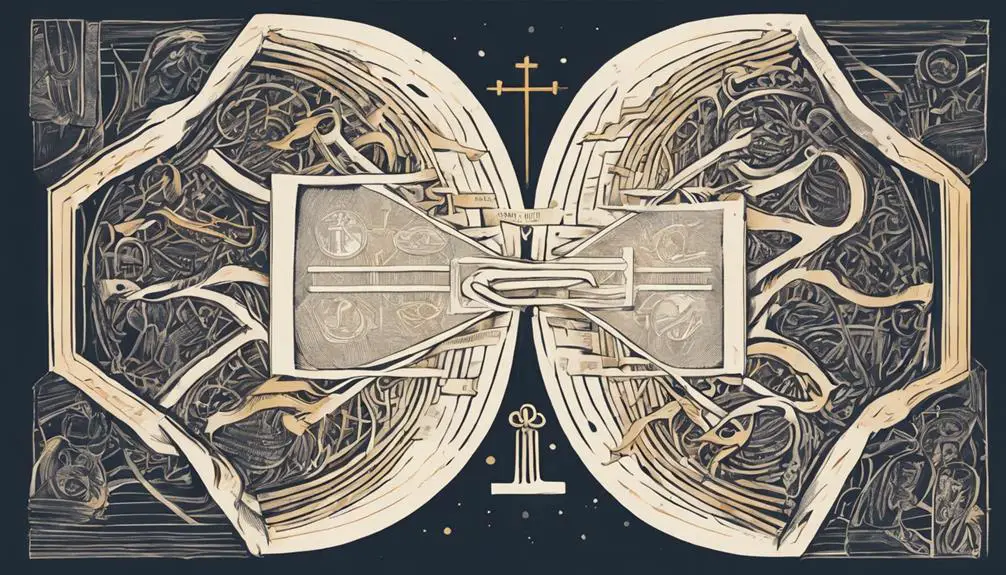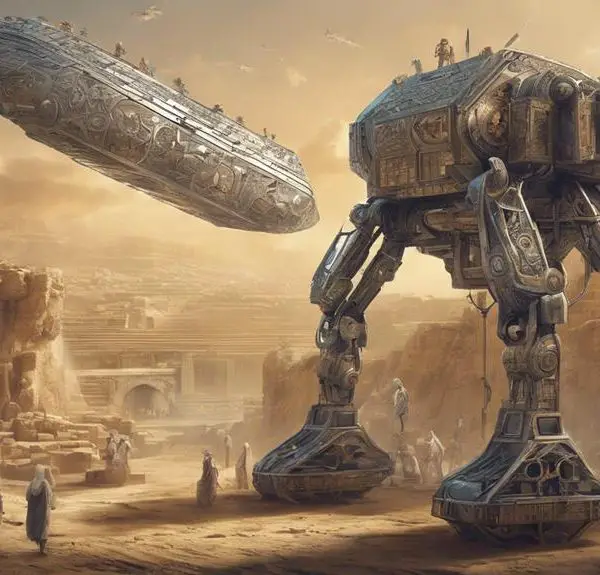Harness the mystery of the 'Restrainer' in the Bible, an enigmatic figure holding back chaos, and embark on a spiritual journey of intriguing interpretations.

Restrainer in the Bible
Imagine standing at the edge of a deep, ancient forest, where secrets and mysteries abound. You've heard of the 'Restrainer' in the Bible, haven't you? It's that elusive entity, mentioned in 2 Thessalonians, who's believed to hold back the lawless one until the proper time.
But who or what could it be? Various interpretations and theories are swirling around this enigmatic figure, leaving us with more questions than clarity.
We're about to venture further into this forest of mystery – won't you join us?
Key Takeaways
- The 'Restrainer' symbolizes divine intervention, curbing chaos and evil in biblical eschatology.
- Key biblical references to the 'Restrainer' are found in 2 Thessalonians, focusing on restraint of the 'lawless one'.
- The identity of the 'Restrainer' is subject to scholarly debate, with theories ranging from the Holy Spirit to powerful angels.
- The 'Restrainer's' multifaceted symbolism encourages believers to exercise self-restraint and contributes to the richness of biblical exploration.
Understanding the 'Restrainer' Concept

Delving into the 'Restrainer' concept, you'll find it to be a complex theological idea, deeply embedded within biblical eschatology, requiring careful analysis and critical interpretation. The Restrainer's role is often interpreted as a divine force that holds back or restrains the unleashing of chaos, evil, or in some interpretations, the Anti-Christ.
The Restrainer's symbolism, like much of biblical eschatology, is layered and multifaceted. Often depicted as a celestial figure, the Restrainer stands as a metaphor for divine intervention, serving to maintain cosmic order amidst potential disarray.
However, to truly comprehend the Restrainer's role and symbolism, you mustn't limit yourself to a literal interpretation. The Restrainer acts as a theological placeholder, embodying the idea of restraint, discipline, and control. It's a concept that urges believers to exercise self-restraint, to resist temptation, and to maintain order in their own lives.
In essence, the Restrainer symbolizes the divine power that curbs humanity's darker impulses and chaotic tendencies. The concept isn't just about God's intervention, but also about mankind's responsibility towards self-regulation, moral integrity, and spiritual discipline. Understanding the Restrainer is thus a nuanced journey, one that requires a balanced blend of textual analysis, theological acumen, and spiritual introspection.
Biblical References to the 'Restrainer

To navigate the labyrinth of biblical references to the 'Restrainer', it's crucial to first turn to key passages in the New Testament, particularly in 2 Thessalonians, where the concept is most prominently discussed. Here, Paul speaks of a force that restrains the revelation of the 'lawless one,' creating a sense of mystery around the 'Restrainer's' identity and purpose.
The following table summarises these key references:
Biblical Reference |
Significance |
|---|---|
2 Thessalonians 2:6-7 |
Paul speaks of the 'Restrainer' as something currently holding back the 'lawless one' |
2 Thessalonians 2:8 |
Paul hints at the 'Restrainer's' eventual removal |
2 Thessalonians 2:9-10 |
Paul describes the chaos following the 'Restrainer's' removal |
From these passages, it's evident that the 'Restrainer' is a significant force in the biblical narrative, directly linked to restraining the emergence of the 'lawless one'. However, these references leave much room for interpretation, particularly regarding the 'Restrainer's' identity and purpose. These aspects are shrouded in mystery, creating a rich topic for scholarly debate and theological exploration. In the next section, we'll delve further into the different interpretations of the 'Restrainer'.
Different Interpretations of the 'Restrainer

In examining various interpretations of the 'Restrainer', you'll find that scholars and theologians often diverge in their views, offering unique perspectives on this enigmatic figure's identity and purpose.
Some propose that the 'Restrainer' is a divine entity, possibly the Holy Spirit or an angel. They argue that the 'Restrainer's Purpose' is to hold back evil until God's appointed time, reflecting the 'Restrainer's Influence' in temporal affairs.
Others suggest that the 'Restrainer' is a human figure, like a political leader or religious authority, whose role is to suppress lawlessness. This interpretation emphasizes the 'Restrainer's Influence' on societal order and morality.
Still, other interpreters believe the 'Restrainer' to be a symbol, representing spiritual forces or principles at play. They argue that the 'Restrainer's Purpose' isn't literal but allegorical, serving as a metaphor for God's control over chaos and evil.
Each interpretation provides a distinct lens through which to understand the 'Restrainer', shaping our understanding of its role and function in the biblical narrative. As such, the divergent interpretations underscore the complexity and depth of biblical literature, inviting ongoing exploration and study.
The Significance of the 'Restrainer

Understanding the significance of the 'Restrainer' requires a deep dive into its perceived role and impact within biblical context, whether it's seen as a divine entity, a human figure, or a symbolic representation. The 'Restrainer' symbolism and implications offer unique insights into the intricate tapestry of biblical narrative and theology.
Consider the following table to get a grasp on the 'Restrainer's' significance:
'Restrainer' Aspect |
Significance |
|---|---|
Divine Entity |
Embodies God's sovereign control over evil |
Human Figure |
Represents human resistance against lawlessness |
Symbolic Representation |
Serves as a metaphor for moral restraint |
Eschatological Role |
Highlights God's ultimate victory over evil |
Theological Implications |
Reinforces belief in God's omnipotence and justice |
Debated Theories Surrounding the 'Restrainer

While you've seen the various aspects and significance of the 'Restrainer', let's now turn our attention to the hotly contested theories that surround this enigmatic figure. The Restrainer's identity is a subject of profound scholarly debate, with many theories proposed.
Some posit the Restrainer as the Holy Spirit, arguing that only a divine entity could restrain evil on such a global scale. Others suggest it's the church, a force for good in the world, while a few even theorize it could be a powerful angel or the archangel Michael.
However, each of these theories presents potential Biblical contradictions. For instance, if the Restrainer is the Holy Spirit, wouldn't its removal contradict scriptures that promise the Spirit's eternal presence? Or if it's the church, does that mean the church must be removed before the 'man of lawlessness' is revealed?
The Restrainer's identity remains shrouded in mystery, with no consensus in sight. These debates not only reflect the complexity of Biblical interpretation but also highlight the captivating enigma that's the 'Restrainer'. As you continue your exploration, you'll find these discussions deepen your understanding and appreciation for this fascinating Biblical concept.
Frequently Asked Questions
How Has the Concept of the 'Restrainer' Evolved Throughout the History of Christianity?
You've asked how the concept of the 'restrainer' has evolved in Christianity. Over time, its symbolism has shifted. Originally, it's seen as a force holding back chaos.
In eschatology, it's often interpreted as the Holy Spirit or the Church. However, interpretations vary greatly depending on theological perspectives and historical context. It's a complex concept that continues to inspire debate among scholars and theologians.
Are There Any Notable Figures in Christianity Who Have Publicly Commented on Their Understanding of the 'Restrainer'?
Yes, you'll find numerous prominent Christian figures have commented on their understanding of the 'Restrainer'. They've shared unique interpretations and symbolism associated with this concept.
St. Paul, for instance, referred to the 'Restrainer' as a force holding back the lawless one. Similarly, early church fathers like St. Augustine and St. John Chrysostom offered their insights, enriching the discourse on 'Restrainer' interpretations within Christian theology.
How Does the Concept of the 'Restrainer' Compare to Similar Figures or Concepts in Other Religions?
When comparing the 'Restrainer's Symbolism' to similar concepts in other religions, you'll discover diverse interpretations. Many faiths have figures or principles that embody restraint or control over evil forces. However, the specific roles, powers, and symbolism associated with these figures may differ vastly.
These comparative religiosity studies offer you a broader understanding of how different cultures and religions perceive and interpret the idea of a 'restrainer'.
Can the 'Restrainer' Be Linked to Any Specific Events or Periods in Biblical History?
You're delving into a contentious topic. The Restrainer's influence isn't explicitly tied to specific events or periods in biblical history. It's primarily interpretations and theological speculation that link the Restrainer to certain occurrences.
There are many interpretation controversies surrounding this issue. It's crucial to approach this with an open, analytical mind, understanding the complexities and nuances involved.
Are There Any Modern Theological Discussions or Debates That Challenge Traditional Views of the 'Restrainer'?
Yes, there's indeed a divergence in the interpretation of the 'Restrainer's Role' in modern theological discussions. Some scholars challenge traditional views, arguing for a different understanding. They suggest the 'restrainer' mightn't be a divine entity but perhaps a human or a societal force.
It's a debate that's adding layers of complexity to theological discourse. You'll find these discussions intriguing if you're interested in examining biblical concepts from a contemporary perspective.
Conclusion
In conclusion, your grasp of the 'Restrainer' in the Bible sharpens through analysis of biblical references, varied interpretations, and debated theories. Its significance, often linked to end times prophecy, prompts intellectual curiosity.
Despite differing views, be it the Holy Spirit, the Church, or government, the 'Restrainer's' role in theology remains pivotal.
Thus, continue exploring this complex, intriguing topic to deepen your biblical understanding and enrich your spiritual journey.



Sign up